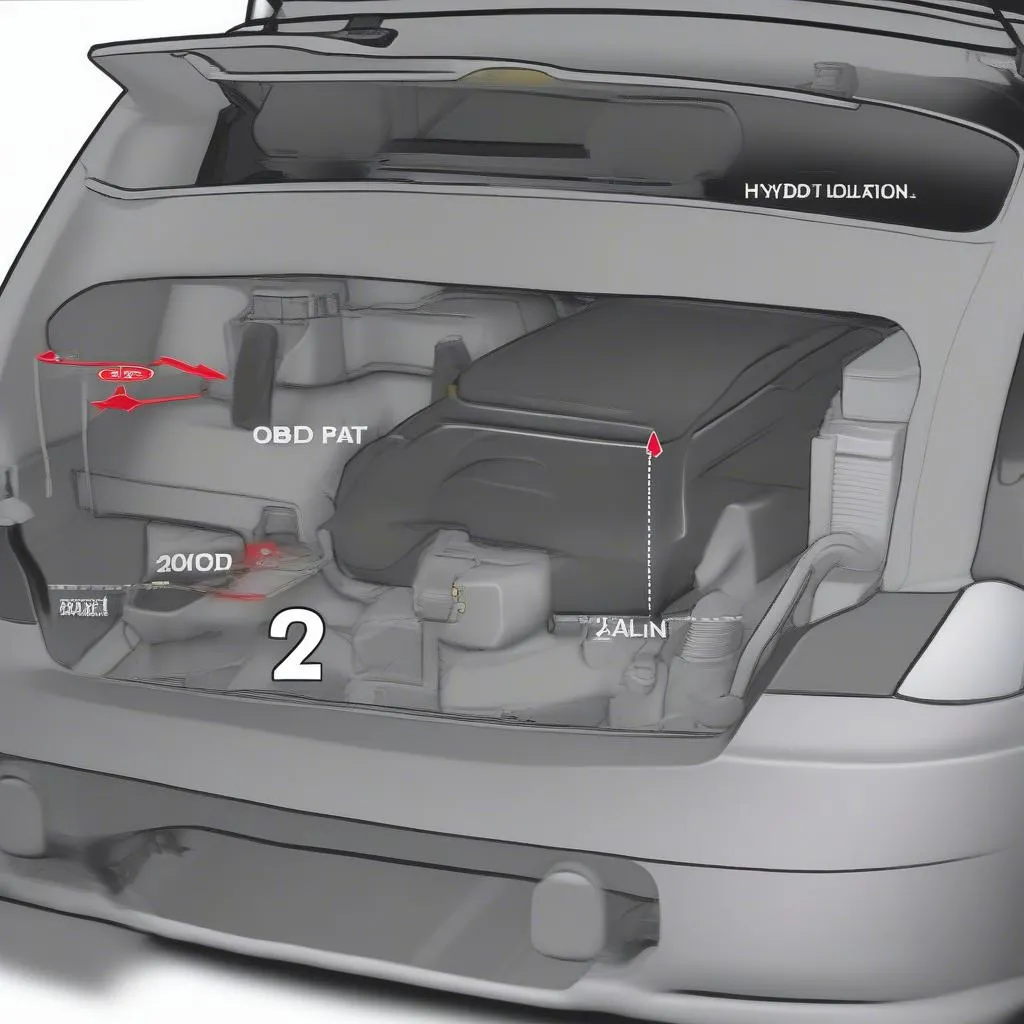Imagine this: You’re driving your 2003 Hyundai Accent down a scenic highway, enjoying the open road. Suddenly, the check engine light illuminates on your dashboard, throwing a wrench into your tranquil drive. This is where understanding your car’s OBD port becomes crucial. The OBD port, or On-Board Diagnostics port, is a vital connection point that allows you to access diagnostic information about your car’s engine and emissions system. It’s like a secret gateway into your car’s health, providing valuable insights that can help you diagnose and troubleshoot issues before they escalate.
Understanding the OBD Port: Your Car’s Secret Weapon
The OBD port serves as a gateway to your car’s engine control unit (ECU), the brain behind your car’s operation. It’s a standardized connector, meaning it’s the same across most vehicles made after 1996. This standardization ensures compatibility with diagnostic tools and scanners, enabling mechanics and enthusiasts to access and analyze crucial data about your car’s performance.
Why Is the OBD Port Important?
- Diagnostic Powerhouse: The OBD port allows mechanics and diagnostic tools to read and analyze data stored within your car’s ECU. This data provides valuable insights into the engine’s performance, fuel consumption, emissions, and other crucial aspects.
- Early Issue Detection: Accessing the OBD port enables early detection of potential problems, like faulty sensors or engine misfires, allowing for proactive maintenance and preventing costly repairs.
- DIY Troubleshooting: For those comfortable with car mechanics, the OBD port allows you to diagnose and troubleshoot simple issues yourself. This can save you time and money by identifying problems before scheduling a visit to a mechanic.
Finding the OBD Port in Your 2003 Hyundai Accent
The 2003 Hyundai Accent, like most cars, typically houses the OBD port beneath the dashboard, near the steering column. To find it:
- Locate the Steering Column: Begin by looking underneath the steering wheel where the steering column is positioned.
- Check Near the Fuse Box: The OBD port is often located close to the fuse box, which is usually found on the driver’s side of the dashboard.
- Examine the Area: Look for a 16-pin connector, which resembles a square-shaped port with a row of pins on each side. It may be covered by a small plastic or rubber flap to protect it from debris.
 Hyundai Accent OBD Port Location
Hyundai Accent OBD Port Location
Common OBD Port Issues and Solutions
While the OBD port itself is generally robust, you might encounter a few issues:
- Corrosion: Over time, corrosion can build up on the connector pins, hindering connectivity.
- Loose Connections: The port may become loose due to frequent use or wear and tear, causing intermittent connections.
Solutions:
- Clean the Connector: Use a small brush and a bit of electrical contact cleaner to remove any debris or corrosion from the port pins.
- Tighten the Connection: If the connection is loose, you can gently tighten it with a small screwdriver, ensuring a firm connection.
Frequently Asked Questions (FAQs)
What is the difference between OBD and OBD II?
OBD II is the second generation of the On-Board Diagnostics system, introduced in 1996. It is a standardized system that enhances the ability to access and diagnose vehicle data. Most cars manufactured after 1996 are equipped with OBD II ports, making them compatible with a wider range of diagnostic tools and scanners.
Can I use a generic OBD scanner on my 2003 Hyundai Accent?
Yes, most generic OBD II scanners will work with your 2003 Hyundai Accent. These scanners can read and interpret diagnostic codes stored in your car’s ECU, providing valuable information about potential issues.
Where can I get a Hyundai Accent OBD scanner?
You can find Hyundai Accent OBD scanners at various retailers, including online stores like Amazon and eBay, or at auto parts stores like AutoZone, O’Reilly Auto Parts, and Advance Auto Parts.
Looking for Professional Help?
If you’re unsure about your 2003 Hyundai Accent’s OBD port or need assistance diagnosing any issues, contact us at +84767531508! We offer 24/7 support and have expert technicians available to guide you through any car diagnostics needs.
Conclusion
Understanding your 2003 Hyundai Accent’s OBD port is crucial for proactively maintaining your car’s health. By accessing and interpreting data stored in your ECU, you can diagnose potential problems, optimize performance, and ultimately extend the lifespan of your vehicle. Keep in mind that while OBD technology is a powerful tool, it’s always best to consult with a qualified mechanic if you’re unsure about any repairs or modifications.
Don’t hesitate to leave a comment below with any questions or share your experience with the OBD port on your 2003 Hyundai Accent. We appreciate your feedback and are here to help you navigate the exciting world of car diagnostics!